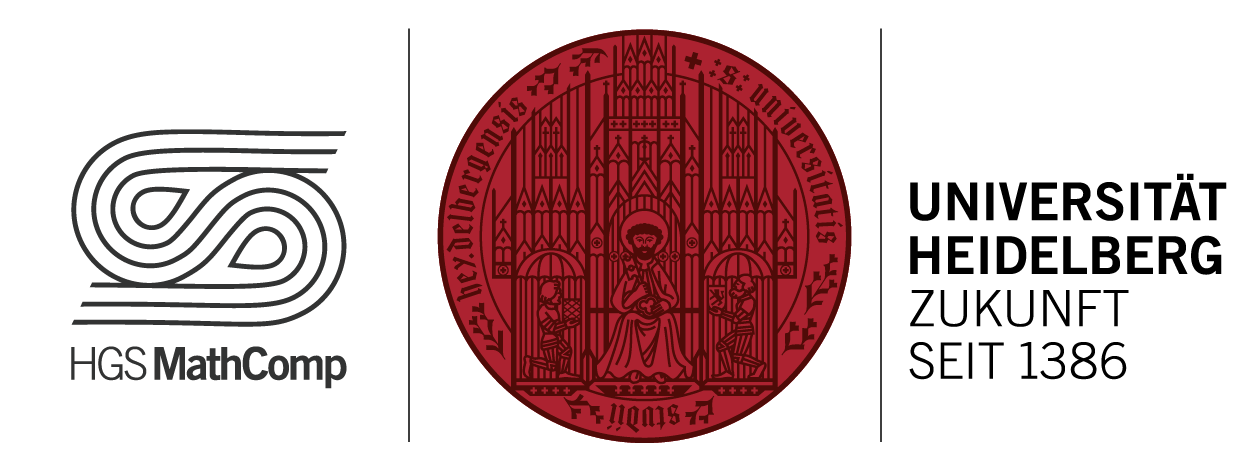
HGS MathComp - Where Methods Meet Applications
The Heidelberg Graduate School of Mathematical and Computational Methods for the Sciences (HGS MathComp) at Heidelberg University is one of the leading graduate schools in Germany focusing on the complex topic of Scientific Computing. Located in a vibrant research environment, the school offers a structured interdisciplinary education for PhD students. The program supports students in pursuing innovative PhD projects with a strong application-oriented focus, ranging from mathematics, computer science, bio/life-sciences, physics, and chemical engineering sciences to cultural heritage. A strong focus is put on the mathematical and computational foundations: the theoretical underpinnings and computational abstraction and conception.
HGS MathComp Principal Investigators are leading experts in their fields, working on projects that combine mathematical and computational methodology with topical research issues. Individual mentoring for PhD candidates and career development programs ensure that graduates are fully equipped to take up top positions in industry and academia.
Current Opportunities
4EU+ Joint DFH/UFA workshop on AI in Medicine: Optimised Trials with Machine Learning (Paris)
Deadline: April 30, 2024
Upcoming Events [see all...]
09:00 - 12:30
[ more ...]
Location: Mathematikon • Seminar Room 11, 5th floor • Im Neuenheimer Feld 205, 69120 Heidelberg
Registration: Please register here
Organizer: HGS MathComp
This lecture presents some basic topics on probability, Bayesian statistics theory, analytical results on partial differential equations (PDEs) and inverse problems. The combination of these methods led to general approaches that can be used to derive efficient and robust approximations to solve inverse problems with uncertainty quantification. By the end of this course, students will gain insights into how these methods contribute to providing more accurate and reliable schemes to solve inverse problems with uncertainty quantification.
In the practice sessions, we present specific inverse problems, allowing the students to actively engage with the material and develop practical solutions through coding exercises.
- Introduction: mathematical models and inverse problems.
- Basic topics in probability theory and functional analysis.
- Inverse problems, Bayesian inference and uncertainty quantification.
- Existence and consistency (stability) of posterior distributions.
- Exploring the posterior and sampling methods.
- Stability estimates for linear PDEs and physically informed models.
- Day 1: 2 x 90 minutes sessions
- Day 2 to 4: 1 90 minutes session + 1 90 minutes practice session
12:00 - 13:00
[ more ...]
Organizer: Scientific Software Center (SSC)
The RSE coffee hour aims to bring together RSEs at all career stages! Join us for a cup of coffee and chat about challenges and strategies for developing research software.
*Research Software Engineer (RSE) = someone who develops their own software as part of their
research
**https://ssciwr.github.io/lunch-time-python/
Organizer: HGS MathComp
The BlueSheet Meeting will be held online for all new members of HGS MathComp on April 30, 2024 between 14:00 - 15:00.
“Modeling of urban microclimate and mobility effects on mosquito abundance and vectorial competence”
14:50 - Hannah Weiser (Supervisor B. Höfle)
“It all starts with data – Improving machine learning-based point cloud algorithms for forest applications with synthetic training data generated by virtual laser scanning”
15:10 - Ronald Tabernig (Supervisor B. Höfle)
„Simulating laser scanning of dynamic virtual 3D scenes for improved 4D point cloud-based topographic change analysis“
15:30 - 10-minute break
15:40 - Niklas Reinhardt (Supervisor J. Zech)
“Domain Uncertainty Quantification”
16:00 - Marco Hübner (Supervisor L Maier-Hein)
“Spectral Image Synthesis for Training Intelligent Surgical Systems”
16:20 - Julian Niederer (Supervisor E. Kostina)
"Numerical Methods for Nonlinear Model Predictive Control for Control Problems with Blocks of Vanishing Constraints”

